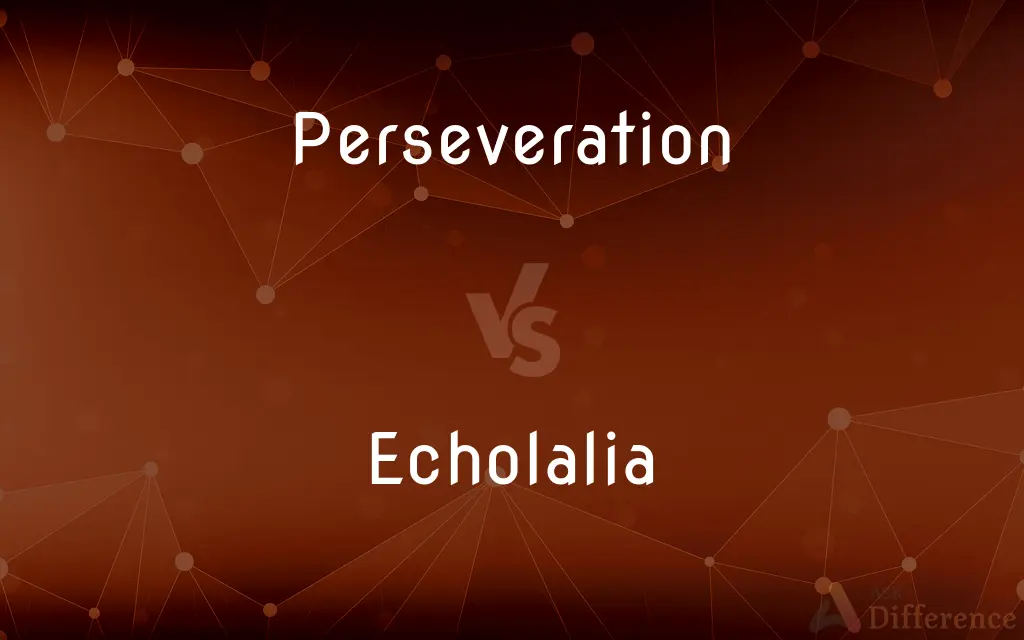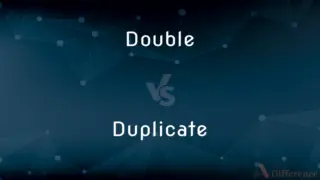Perseveration vs. Echolalia — What's the Difference?
By Fiza Rafique & Maham Liaqat — Updated on March 17, 2024
Perseveration involves repetitive thoughts or behaviors, while echolalia is the automatic repetition of vocalizations.

Difference Between Perseveration and Echolalia
Table of Contents
ADVERTISEMENT
Key Differences
Perseveration is characterized by the involuntary repetition of a particular response, such as a word, phrase, or gesture, even when it is no longer relevant or appropriate. This can occur in various cognitive tasks and is often seen in neurological and psychiatric conditions. Whereas echolalia specifically involves the immediate or delayed repetition of words or phrases spoken by others, and is commonly observed in individuals with autism, Tourette syndrome, and certain other developmental disorders.
While perseveration can manifest in both verbal and non-verbal behaviors, echolalia is exclusively verbal. Perseveration might involve repeatedly checking a door to ensure it's locked, while echolalia would involve repeating someone else's statement about the door being locked.
Perseveration is often linked to difficulties in shifting attention or disengaging from a specific thought pattern, task, or behavior. It reflects a disruption in executive functions that regulate planning, flexibility, and goal-directed actions. On the other hand, echolalia might serve various functions, such as facilitating communication, processing language, or serving as a coping mechanism for anxiety or stress.
In the context of therapy and intervention, approaches to addressing perseveration often involve cognitive-behavioral strategies aimed at improving flexibility and reducing repetitive behaviors. Conversely, interventions for echolalia may focus on enhancing language and communication skills, understanding the underlying purpose of the echolalic behavior, and providing alternative means of expression.
Understanding the distinction between perseveration and echolalia is crucial for accurate diagnosis and intervention. While both involve repetition, their underlying causes, manifestations, and implications for intervention differ significantly.
ADVERTISEMENT
Comparison Chart
Definition
Repetition of thoughts or behaviors
Repetition of vocalizations
Manifestation
Verbal and non-verbal
Exclusively verbal
Associated Conditions
Neurological, psychiatric disorders
Autism, Tourette syndrome, developmental disorders
Function
Difficulty in shifting attention
Communication, processing, coping
Intervention
Cognitive-behavioral strategies
Language and communication enhancement
Compare with Definitions
Perseveration
Involuntary repetition of a particular response, irrelevant or inappropriate.
He kept checking his email repeatedly, a sign of perseveration.
Echolalia
Immediate or delayed repetition of words or phrases spoken by others.
His echolalia made him repeat the last word of every sentence he heard.
Perseveration
Often linked to executive function disruption.
Perseveration in his actions reflected challenges in shifting attention.
Echolalia
Serves as a mechanism for processing language or coping.
For him, echolalia was a way to understand and process conversations.
Perseveration
Manifests in various cognitive tasks and behaviors.
Her tendency to stick to one topic in conversation was due to perseveration.
Echolalia
Intervention focuses on improving communication skills.
Speech therapy for echolalia aimed at expanding his expressive language.
Perseveration
Indicates difficulties in disengaging from specific thought patterns.
Continuous re-reading of a sentence pointed to perseveration.
Echolalia
Reflects the automatic nature of vocal repetition.
Her echolalic responses were automatic and not always contextually relevant.
Perseveration
Can be addressed through cognitive flexibility strategies.
Therapy for her perseveration focused on enhancing task-switching abilities.
Echolalia
Common in autism and certain developmental disorders.
Echolalia is often one of the first signs of autism in children.
Perseveration
Perseveration, in the fields of psychology, psychiatry, and speech-language pathology, is the repetition of a particular response (such as a word, phrase, or gesture) regardless of the absence or cessation of a stimulus. It is usually caused by a brain injury or other organic disorder.
Echolalia
Echolalia is the unsolicited repetition of vocalizations made by another person (when repeated by the same person, it is called palilalia). In its profound form it is automatic and effortless.
Perseveration
Repetition of a behavior, idea, or phrase in absence of any functional purpose for the repetition, usually caused by brain injury or other disorder.
Echolalia
Meaningless repetition of another person's spoken words as a symptom of psychiatric disorder.
Perseveration
The tendency to continue or repeat a behavior, sensation, or thought after the cessation of the original stimulus.
Echolalia
Repetition of speech by a child learning to talk.
Perseveration
The act or an instance of persevering; perseverance.
Echolalia
The repetition of words or phrases spoken by others, often occurring in people with autism spectrum disorder and certain other mental disorders.
Perseveration
(psychology) Uncontrollable repetition of a particular response, such as a word, phrase, or gesture, despite the absence or cessation of a stimulus, usually caused by brain injury or other organic disorder.
Echolalia
(clinical psychology) The immediate, involuntary, and repetitive echoing of words or phrases spoken by another.
Perseveration
(psychology) The tendency to continue or repeat an act or activity after the cessation of the original stimulus.
Echolalia
An infant's repetitive imitation of vocal sounds spoken by another person, occurring naturally during childhood development.
Perseveration
The act or an instance of persevering; perseverance.
Echolalia
Any apparently meaningless, repetitious noises, especially voices.
Perseveration
Argument by repetition; a mantra.
Echolalia
An infant's repetition of sounds uttered by others
Perseveration
The tendency for a memory or idea to persist or recur without any apparent stimulus for it
Echolalia
(psychiatry) mechanical and meaningless repetition of the words of another person (as in schizophrenia)
Perseveration
The act of persisting or persevering; continuing or repeating behavior;
His perseveration continued to the point where it was no longer appropriate
Common Curiosities
Can perseveration be a form of echolalia?
While both involve repetition, perseveration is broader and can include non-verbal behaviors, unlike echolalia which is exclusively verbal.
Are there specific therapies for perseveration?
Cognitive-behavioral strategies that improve cognitive flexibility and reduce repetitive behaviors are often used.
Can echolalia be beneficial in any way?
Yes, it can serve communicative purposes and help individuals process language or manage stress.
Can perseveration occur in healthy individuals?
Occasional perseveration can occur in stressful situations, but persistent perseveration is usually indicative of an underlying issue.
How does perseveration affect daily life?
It can interfere with task completion, social interactions, and overall functioning due to the inability to shift from repetitive patterns.
Can echolalia develop later in life?
While typically observed in developmental stages, echolalia can also emerge following neurological events or in certain psychiatric conditions.
How is echolalia addressed in therapy?
Interventions may include language and communication skill enhancement, understanding the purpose of echolalia, and providing alternative communication methods.
What is the main difference between perseveration and echolalia?
Perseveration involves repetitive thoughts or behaviors, while echolalia is the repetition of vocalizations.
Are all forms of repetition in speech considered echolalia?
No, echolalia specifically refers to the repetition of another person's vocalizations, not self-initiated repetition or stuttering.
Is echolalia always indicative of a disorder?
Echolalia can be a normal part of language development in children, but persistent echolalia is often associated with developmental disorders.
How do cognitive functions relate to perseveration?
Perseveration is often related to disruptions in executive functions, such as flexibility and goal-directed behavior.
Is echolalia a choice?
Echolalia is generally not a conscious choice; it's an automatic response that can be influenced by various factors.
Can interventions for perseveration and echolalia overlap?
Yes, strategies that enhance communication and flexibility can be beneficial for both, though specific approaches may vary.
Does perseveration only relate to actions?
No, it can also involve persistent thoughts, speech, or emotional responses.
Is there a genetic component to either condition?
Both conditions can have genetic influences, especially in the context of underlying disorders like autism or neurological conditions.
Share Your Discovery

Previous Comparison
Electrode vs. Anode
Next Comparison
Double vs. DuplicateAuthor Spotlight
Written by
Fiza RafiqueFiza Rafique is a skilled content writer at AskDifference.com, where she meticulously refines and enhances written pieces. Drawing from her vast editorial expertise, Fiza ensures clarity, accuracy, and precision in every article. Passionate about language, she continually seeks to elevate the quality of content for readers worldwide.
Co-written by
Maham Liaqat















































